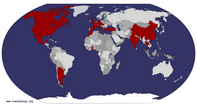~From the Bradt Rwanda guide
It’s a little creepy wondering how the people my age and older I see walking on the streets participated in the genocide. Were they the victims or the perpetrators? Did they betray their neighbors? Do they continue to harbor resentment? Is 17 years enough time to heal from the unthinkable?

People here are shy, soft-spoken and reserved. They keep their distance. We’ve met people and they are friendly, but Rwanda is no Ghana. These people have much more sadness.
People, as a rule don’t speak about the genocide. But when they do they speak about it with a far off look in their eyes:
“I left Rwanda after the genocide and have just now come back…It is so strange how different it is now. I never thought I would feel safe again. Even after it was finished, they were killing the survivors, so we wouldn’t expose their role in the genocide.”
Or
“My father’s entire side of the family was killed in the genocide. My mother moved to Uganda and even though all 10 of her kids are here she won’t come back because she’s afraid it will happen again. She has barely survived…It was my father, even though uneducated, who was good at business…”
But I never thought about how a lot of people who went through those kind of statistics listed above might have literally gone crazy and never got treated for it.
I was sitting at an internet café extremely focused working on a product launch email. The internet café was my last resort after wifi having failed me at two different restaurants and the internet stick having had a glitch. I guess no one ever promised the internet would be fast in the heart of Africa.
A skinny guy who looked about 40 years old (but people look older than they are here) with intense, big eyes started talking to me. At first he was just friendly, exchanging niceties like names. His was Malcolm X. All of a sudden he got up in my face and started talking about how he barely survived the genocide. He was talking fast. He rolled up his sleeve and told me he got the virus-- AIDS. They killed his family. He barely made it across the border with the help of the Tutsi army. He told me he couldn’t get a job because of his health.
I felt very uncomfortable during this rapid-fire speech, as he leaned in close to me and looked around as though paranoid. He asked me if I would buy him dinner.
At this point I really needed to get back to the launch, so instead of taking him to buy food like I might have normally, I gave him 1500 francs, about 3 dollars. He seemed to me as though he was straight up mentally ill, so I decided to help him. I shouldn’t have. Giving cash is almost always a bad idea. It was likely as I was fishing around looking for change that he took my newly bought cell phone.
I didn’t notice my cell phone was gone until I met up with Jacob, who told me he had tried to call me. A guy had answered and told him I was in the bathroom and he was watching my stuff. It had to be Malcolm X.
We have continued to call each other back and forth over the last couple of days. He answers and asks “how are you?” He sometimes calls us back. To us, he is obviously crazy. It wouldn’t surprise me if the whole country is overrun with basket cases. If not basket cases, at least very troubled souls. That’s eerie.
So I have to admit a different kind of safety problem here: the traffic is orderly, the food is cleanly prepared, people are pleasant if reserved, and crime is low. But—the government can’t be classified as stable. It’s one reason I doubt we’d ever want to settle down here for any period of time.
I reported the thievery back at the internet café and they were completely blasé about it. They even knew the guy. It seemed as though pickpocketing were a common occurrence and it wasn’t anything to even make a fuss about.
Rwanda’s gorgeous exterior is hiding her troubled interior


















